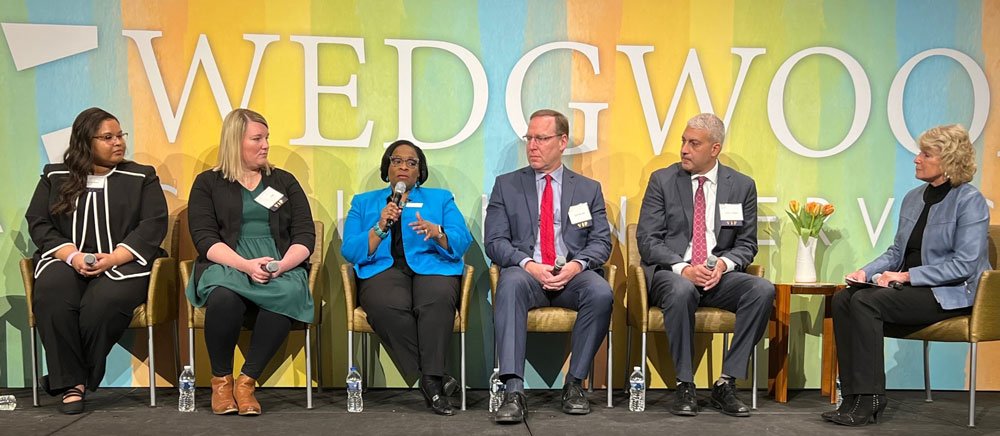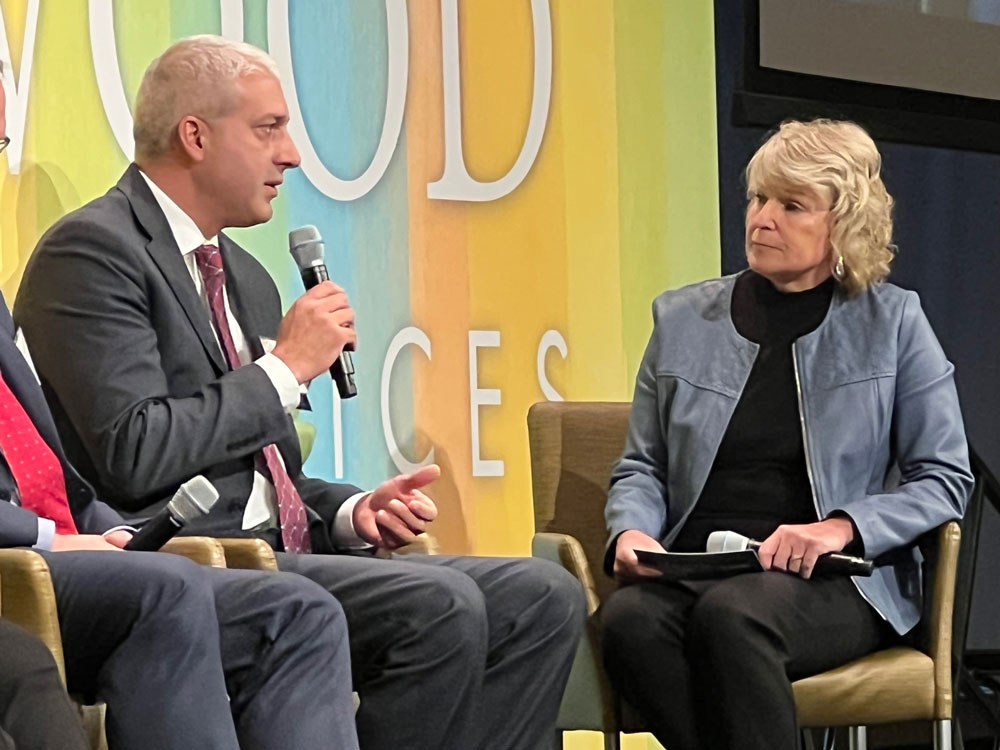Multi-districts — Seventh-grader Alana described teens as “really good actors” when it comes to their mental health.
“There are things that people are going through, and there are times when we’re just putting on a show,” Alana said, while serving as a student panelist at Wedgwood’s State of the Child recent event at Frederik Meijer Gardens & Sculpture Park.
Alongside other teens representing the Wedgwood’s TEEN Charge student leadership group, Alana answered a variety of questions during a pre-recorded interview with WOOD-TV8/WOTV kids and family expert Maranda.
“We can be around you laughing and happy and then as soon as we’re alone, we cry and hate ourselves.”
After two years of virtual events and socially distanced conversations, local middle and high school students returned in person to share their thoughts and opinions on this year’s list of topics: mental health, substance abuse, trauma, social media, and relationships with peers and parents.
Sparsh, a junior and returning panelist, felt both nervous and excited for the audience to hear his interview responses. “It’s super valuable to ask teens ‘what’s wrong’ and allow them to give a raw, unfiltered response and not having adults speak for us.”
He added: “Last year’s panel was a lot more pandemic-central and this year focused more on mental health and how parents can support teens.”
Junior Emily also participated in last year’s event.
“I’m really excited because I think it’s important to have a teen’s perspective. Not all teens are willing to talk,” Emily said.
In response to their pre-recorded interviews, Maranda moderated a conversation with the live panel of community leaders and experts, who took turns responding and offering their perspectives.
Panelists included Kent County Prosecuting Attorney Chris Becker; Wedgwood Residential Treatment therapist Kali Jackson; Spectrum Health Section Chief of Adolescent & Young Adult Medicine Dr. Lisa Lowery; Kentwood Public Schools Superintendent Kevin Polston; and Wedgwood Substance Use Disorder Clinical Supervisor Kari Schulte.

Mental Health a Major Concern
On the topic of mental health, the panelists discussed how during the pandemic, one in four people ages 12-15 have contemplated suicide, according to the Centers for Disease Control and Prevention.
Spectrum Health’s Lowery described an influx of young people with eating disorders, suicidal ideation and other issues as a “mental health tsunami.”
“I’ve never seen anything like this before. It’s complicated and complex and I applaud their honesty,” she said of the teens.
As an educator, Polston explained how schools are striving to be safe spaces for students, where “caring adults value relationships with students.”
“Our students cannot be academically successful until they’re socially and emotionally whole,” he said.
Emily described a “pressure to do well” as a teen and how “it can really get you down.”
“It’s been a rough year, so go easy on us. We need your support,” Sparsh added.
Trauma Plays a Role
On the topic of how students respond to trauma, Jackson, the Wedgwood therapist, clarified the difference between “big T and little t” trauma.
“Big T trauma, like sexual assualt, physcial violence and natural disasters, is what causes PTSD, and nightmares,” she said. “Little t trauma is infidelity, moving around a lot as a kid, but it’s not something that is going to overwhelm the entire body.”
Lowery noted, “A lot of times this trauma is familial; trauma builds and students learn good and bad coping mechanisms for dealing with trauma from their families.”
Middle school student River acknowledged that signs of a person’s trauma are “not always obvious” and “every kid will react and process trauma differently.”
‘It’s super valuable to ask teens ‘what’s wrong?’ and allow them to give a raw, unfiltered response and not having adults speak for us.’
– high school junior Sparsh
Vaping is Very Common
Living with mental health issues or forms of trauma, some teens turn to vaping to cope. “This isn’t ‘your parents’ marijuana’ people are using,” cautioned Becker, the Kent County prosecutor.
Wedgwood’s Schulte explained how young kids are putting dab and wax (containing THC in it) into their vape pens, and “they don’t know the dangers.”
“‘Just say no’ doesn’t work,” Polston said. “We have to ask ourselves why aren’t they feeling more connected to their learning or school that causes them to seek out methods of coping?”
Several students commented on how vaping happens as early as sixth grade and some witnessed it happening in school bathrooms.
“Do you want to ruin your life over a few minutes of euphoria?” Sparsh asked.
A Tool and a Threat
In regards to social media, Polston compared teens using social media to learning to drive a car. The key is to teach young people how to navigate it as a tool, rather than take it away from them.
“Auto accidents are the leading cause of teen death but we still let them drive; we give kids a phone without any training or restrictions,” he said. “It’s about teaching and educating versus withdrawal.”
Jackson said social media has the power to “build up teens’ self-esteem or damage it.”
Zoey, an eighth-grader, said she has a “love/hate relationship with social media.”
Sparsh said he believes “social media encourages you to get down on yourself when you’re given unrestricted internet access.”
At the conclusion of the panel, Maranda summarized the teen’s advice for parents as “go easy on us; we’re doing our best; life is hard; and let’s just talk.”
Jackson offered her advice for parents in forming healthy and trusting relationships with their kids.
“The only way out is through,” she said. “It’s not a phase; this is real life stuff, and growth happens outside of our comfort zones.”
Students’ last names are not used for privacy reasons.









